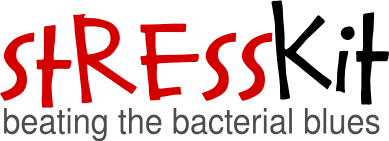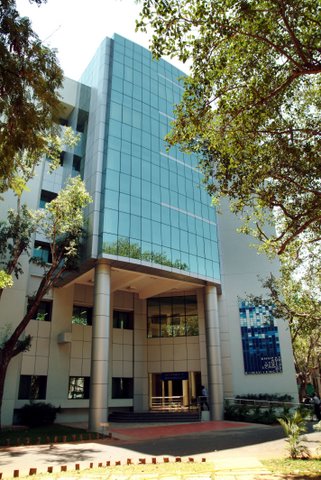Team:IIT Madras
From 2008.igem.org
Sayashkumar (Talk | contribs) m |
Sayashkumar (Talk | contribs) (→Overview) |
||
| Line 9: | Line 9: | ||
| - | = | + | =StressKit= |
{|align=center width=80% | {|align=center width=80% | ||
| + | |rowspan=2|''A BioBrick library of Lac-repressed σ<sup>24</sup>, σ<sup>28</sup>, σ<sup>32</sup> and σ<sup>38</sup> promoters for Escherichia coli'' | ||
| - | + | Regulated gene expression is an essential part of the synthetic biologist's toolkit. Bacteria have evolved 'generalized stress response systems' which generate genome-wide changes in gene expression in response to globally-integrated information. Specific types of stress upregulate specific 'alternative sigma factors', which activate transcription by binding to nucleotide signatures at the -10 and -35 boxes of their cognate promoters. We set out to design, construct, and validate a library of sigma-dependent promoters for Escherichia coli, with the following design specifications: the promoters must conform to the BioBrick standard; they must be modular so they can be used multiply in devices; and they must be LacI repressed but sigma-dependent, off by default but behaving like native sigma-dependent promoters in the presence of IPTG. All our promoters are based on the LacO promoter of Lutz and Bujard, containing two LacI binding sites, but with -10 and -35 boxes modified to bind alternative sigma factors. We generated four hybrid promoters for each of the following: | |
| + | * σ<sup>24</sup>: unfolded-protein response | ||
| + | * σ<sup>28</sup> flagellar biosynthesis | ||
| + | * σ<sup>32</sup> heat-shock response | ||
| + | * σ<sup>38</sup> stationary-phase expression | ||
| - | + | We then cloned these promoters upstream of a YFP expression construct (BBa_E0430). We are currently characterizing the library of promoters against a standard control, the unmodified Lutz-Bujard LacO promoter, using spectrophotometry and fluorescence microscopy. | |
| - | + | Take a look into our detailed design documents to know more about the project, the [[Team:IIT_Madras/Project|''StressKit'']]. | |
| - | + | Browse through the [[Team:IIT_Madras/Notebook|experiments notebook]] to read our experimental data. | |
| - | + | To know more about the team, IIT Madras and who exactly we are,[[Team:IIT_Madras/Team|click here]]! | |
| - | + | ||
| - | + | ||
| - | + | ||
| - | + | ||
| - | + | ||
| - | + | ||
| - | + | ||
| - | + | ||
!align=right valign=top | [[Image:IITitbiotech.jpg|left|thumb|''Dept. of Biotechnology<br>IIT Madras]] | !align=right valign=top | [[Image:IITitbiotech.jpg|left|thumb|''Dept. of Biotechnology<br>IIT Madras]] | ||
Latest revision as of 13:55, 29 September 2008
| Home | About Us | Project Details | Notebook |
|---|
StressKit
| A BioBrick library of Lac-repressed σ24, σ28, σ32 and σ38 promoters for Escherichia coli
Regulated gene expression is an essential part of the synthetic biologist's toolkit. Bacteria have evolved 'generalized stress response systems' which generate genome-wide changes in gene expression in response to globally-integrated information. Specific types of stress upregulate specific 'alternative sigma factors', which activate transcription by binding to nucleotide signatures at the -10 and -35 boxes of their cognate promoters. We set out to design, construct, and validate a library of sigma-dependent promoters for Escherichia coli, with the following design specifications: the promoters must conform to the BioBrick standard; they must be modular so they can be used multiply in devices; and they must be LacI repressed but sigma-dependent, off by default but behaving like native sigma-dependent promoters in the presence of IPTG. All our promoters are based on the LacO promoter of Lutz and Bujard, containing two LacI binding sites, but with -10 and -35 boxes modified to bind alternative sigma factors. We generated four hybrid promoters for each of the following:
We then cloned these promoters upstream of a YFP expression construct (BBa_E0430). We are currently characterizing the library of promoters against a standard control, the unmodified Lutz-Bujard LacO promoter, using spectrophotometry and fluorescence microscopy. Take a look into our detailed design documents to know more about the project, the StressKit. Browse through the experiments notebook to read our experimental data. To know more about the team, IIT Madras and who exactly we are,click here! | |
 "
"

